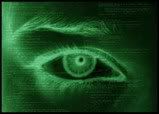Austin police have charged two recently with activity.

By Tony Plohetski
Shawn Macleod wanted to know where his estranged wife was going on the Internet and what she was writing in e-mails, investigators said, so he secretly installed a program called SpyRecon on her computer that sent him electronic logs with the sites she had visited and messages she had sent.
His spying resulted in a four-year prison sentence.
Software programs created to monitor computer activity have grown in popularity in recent years as parents have sought ways to prevent children from accessing adult Web sites or e-mailing possible predators and as businesses have tried to curtail the time employees spend on the Internet when they are at work.
Others, too, have found a use for the software: Scorned lovers can track where their spouses or partners go online, whom they are e-mailing and what they are saying — all possibly in violation of the law.
Austin police considered Macleod's actions tantamount to illegal wiretapping and charged him with unlawful interception of electronic communication, a second-degree felony that can carry a 20-year sentence. Macleod pleaded guilty in May.
"It's pretty alarming," said Macleod's attorney, Johnny Urrutia.
Urrutia said he would be surprised if his client knew that what he was doing was against the law.
Doug Fowler, president of SpectorSoft Corp., which manufactures an Internet monitoring program called eBlaster, said law enforcement agencies nationwide have in recent months sought company records during criminal investigations, hoping the documents would show who installed the software on victims' computers.
In New York this year, a sheriff's deputy was found guilty of eavesdropping after investigators said he spied on the computer activity of a neighbor he thought posed a threat to young girls in their neighborhood.
The deputy was sentenced to five years of probation.
In California, a man was indicted on federal charges in 2005, accused of manufacturing, advertising and sending a program called Lovespy.
In that case, victims received an electronic greeting card that, when opened, would record e-mail messages and the Web sites they visited.
Austin police in recent months have charged two men, including Macleod, with the crime. The second case, filed last month, is pending.
Detective Darin Webster, who works in the department's high-tech crime division, said investigators also have looked into several other cases that didn't result in charges because the evidence had been destroyed or they couldn't conclusively determine who had installed the spyware.
"The problem itself isn't the software," Webster said. "The problem is how the software is being used. ... And in the cases I've seen, there are warnings on there that it may be against the law. In Texas, it is."
State law says it is illegal to intentionally intercept spoken or electronic communication.
The law grants some exceptions, such as to switchboard operators who might hear part of a conversation while doing their job.

The law doesn't address certain questions about computer spyware, such as whether it is legal to install the equipment on a jointly owned computer without the consent of the second owner.
Employers typically have workers sign waivers acknowledging that they know the company computers are monitored.
Parents, as guardians of their minor children, are allowed to monitor their children's activities.
According to court records, Macleod's estranged wife, Kristy, reported to police in August 2005 that she suspected he was monitoring her computer use.
A detective using a fake name sent Kristy Macleod an e-mail offering to buy the couple's pool table.
A few days later, Shawn Macleod confronted Kristy Macleod about the e-mail, according to a probable cause affidavit.
Detectives searched the computer and found SpyRecon software on it, according to the affidavit.
Kristy Macleod could not be reached for comment. Company officials for SpyRecon did not respond to an interview request.
In an online advertisement, the company asks, "Have you ever needed to secretly read the e-mail of your child or spouse?"
In the second case Austin police filed, investigators said Alexis Lugo, 29, installed eBlaster software on his ex-girlfriend's computer.
An affidavit in that case said Kara Winebright called Austin police and reported that she thought Lugo had hacked into her computer and changed the password on some of her accounts.
Winebright said she had broken up with Lugo and later had discovered some unusual activity on her account with eHarmony, a dating Web site. She checked her other online accounts and found similar problems.
Police searched her computer and found the eBlaster software.
Ordinary anti-spy software might not detect such programs, but checking to see which programs and files have been downloaded to hard drives should reveal them, said Fowler, the manufacturer of eBlaster.
Fowler said his company intended for the software to be used only by parents or businesses, not by spying spouses or partners. The company marketed the product that way several years ago but stopped, he said.
"We ultimately decided that it wasn't a market we wanted to participate in," Fowler said. "There are certainly those who buy the software for this kind of thing. But we don't encourage it."
SOURCE
No comments:
Post a Comment